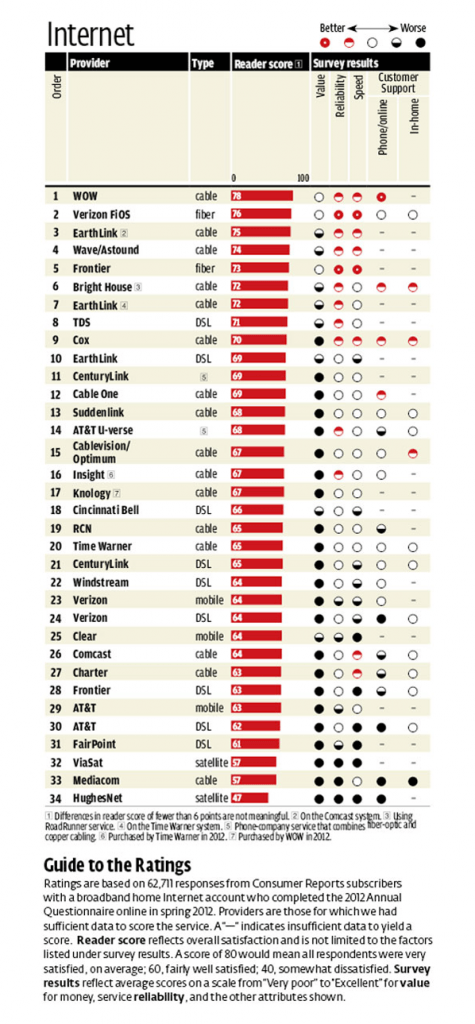
T-Mobile has scrapped the traditional two-year cell phone contract.
T-Mobile’s shift away from subsidized smartphones and standard two-year contracts could be a game-changer for American wireless consumers, but does the scrappy carrier have a good deal for you or mostly for itself?
T-Mobile is and has been America’s fourth largest carrier — the smallest among those offering nationwide home coverage. The provider has lost contract customers for years. T-Mobile’s coverage has been less than great in many areas and it often did not offer the latest and most popular smartphones. After its merger effort with AT&T was shot down by the Department of Justice for anti-competitive reasons, T-Mobile has attempted to remake itself by changing the rules under which most of us buy mobile service.
The biggest change of all is the end of the subsidized phone. For years, cell phone companies have offered free or low-cost phones to customers, earning back that subsidy by charging higher monthly rates and locking customers to two-year contracts with early termination fees. T-Mobile will still give you an affordable phone, only now you will pay it off in small installments over a two-year financing agreement.
What difference does this make? Customers who bounce from one two-year contract to the next may not see much difference. But if you keep your phone longer than two years or buy one elsewhere, your monthly rate with T-Mobile will no longer include an artificially higher price designed to recover the phone subsidy you no longer receive.
It also means nothing traps you with T-Mobile. If after six months you find their service unbecoming, you can leave without hundreds of dollars in termination fees. But customers on financing agreements will continue to make their payments for equipment purchases, and those phones will not be unlocked for use on another carrier until the remaining balance is paid off.
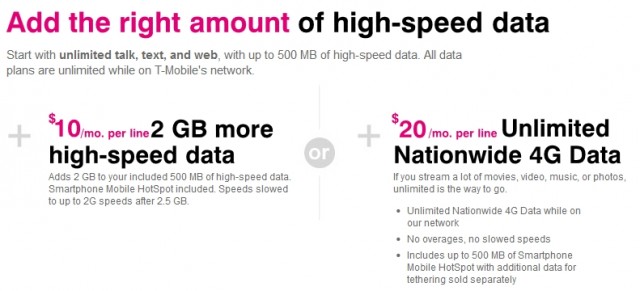
A typical T-Mobile customer looking for the latest iPhone will pay a $100 down payment and then finance the remaining balance, paying $20 a month for 24 months. Your monthly rate will start at $50 a month, which includes unlimited talk and texting, and a 500MB data allowance. If that is insufficient, an extra $10 a month will buy you an extra 2GB of data. If you want unlimited data, that plan is available for an extra $20 a month.
T-Mobile says their plans will save you $1,000 over the life of a two-year contract with AT&T or Verizon. We think they are exaggerating a bit.
Like their competition, T-Mobile is moving away from budget-minded “minute plans” that bundle calling, text and data. Instead, T-Mobile charges at least $50 a month for unlimited talk/text and a small data plan whether you want those features or not.
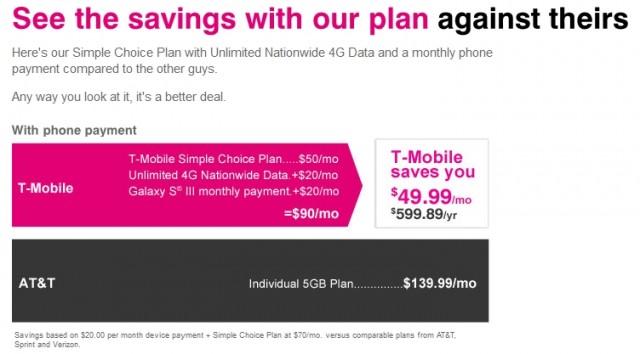
The Associated Press found that although T-Mobile ends up being the cheapest, the savings over its rivals is closer to $700 on average. The price over two years for a 16-gigabyte iPhone 5 with unlimited calling, unlimited texting and 2.5 gigabytes of data usage per month, excluding taxes, is:
- T-Mobile: $2,020
- AT&T/Verizon: $2,635 (2-3GB data plan)
- Sprint: $2,840 (unlimited data plan included)
Some other things to consider:
- Once your phone is paid off, your ongoing T-Mobile bill will no longer show a phone subsidy payback built into prices charged by other carriers;
- You can pay your phone off early, with no penalty;
- T-Mobile’s 4G network is a mix of HSPA+ and LTE. The more commonly encountered HSPA+ network gets good marks for speed, but a number of densely populated T-Mobile coverage areas surprisingly often default to their older 2G network, which is painfully slow. LTE is only available in about seven cities at the moment, so it is still a rarity;
- T-Mobile’s unlimited service is free from tricks and traps like soft caps and speed throttles. It also performs better than Sprint’s unlimited service on its overloaded 3G and spotty Clearwire 4G WiMAX network. Sprint’s LTE network is on the way… slowly. It seems to be rolling out first in small cities you have never heard of;
- T-Mobile’s coverage in rural and exurban areas is frankly terrible. Travelers on main highways may not encounter many signal gaps, but those living in small towns or off the beaten path may get a roaming signal or poor or no reception from T-Mobile’s own towers at all. The frequencies used for its data service also do not work as well indoors as its larger rivals.
[flv width=”640″ height=”380″]http://www.phillipdampier.com/video/T-Mobile Ad 4-2-13.flv[/flv]
T-Mobile channels Oprah in this new ad as the big four wireless cowboys get in touch with their feelings. But only one is ready to don a pink hat and ride off on his own. (1 minute)


 Subscribe
Subscribe Residents of some cities north of Dallas are in the unique position of being able to choose between two phone companies and at least one cable operator for television, phone, and broadband service.
Residents of some cities north of Dallas are in the unique position of being able to choose between two phone companies and at least one cable operator for television, phone, and broadband service.
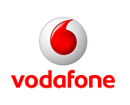 A Financial Times blog post has started a buying frenzy for Vodafone Group Plc on news AT&T and Verizon Communications are about to bid for the British mobile phone giant, despite denials from Verizon it is involved in any deal to acquire the British mobile phone company.
A Financial Times blog post has started a buying frenzy for Vodafone Group Plc on news AT&T and Verizon Communications are about to bid for the British mobile phone giant, despite denials from Verizon it is involved in any deal to acquire the British mobile phone company.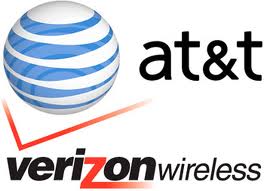 The sources told the Times they expect the deal will initially merge Vodafone and Verizon into a single entity, but only briefly. Verizon would promptly sell Vodafone’s extensive international assets to AT&T at a premium. Verizon would end up the sole owner of Verizon Wireless, and AT&T would acquire Vodafone’s enormous wireless operations in Europe, Asia, Africa and the Middle East.
The sources told the Times they expect the deal will initially merge Vodafone and Verizon into a single entity, but only briefly. Verizon would promptly sell Vodafone’s extensive international assets to AT&T at a premium. Verizon would end up the sole owner of Verizon Wireless, and AT&T would acquire Vodafone’s enormous wireless operations in Europe, Asia, Africa and the Middle East. Virgin Media is in hot water with a UK advertising regulator after the company’s marketing department borrowed one of the tricks successfully employed in the United States: selling “unlimited broadband” service that actually is not unlimited at all.
Virgin Media is in hot water with a UK advertising regulator after the company’s marketing department borrowed one of the tricks successfully employed in the United States: selling “unlimited broadband” service that actually is not unlimited at all.

 “In that context we considered that the restriction of reducing users’ download speeds by 50% was not moderate and that any reference to it was likely to contradict, rather than clarify, the claims that the service was ‘unlimited’,” the ASA said. “We therefore concluded that the claim ‘unlimited’ was misleading.”
“In that context we considered that the restriction of reducing users’ download speeds by 50% was not moderate and that any reference to it was likely to contradict, rather than clarify, the claims that the service was ‘unlimited’,” the ASA said. “We therefore concluded that the claim ‘unlimited’ was misleading.”

